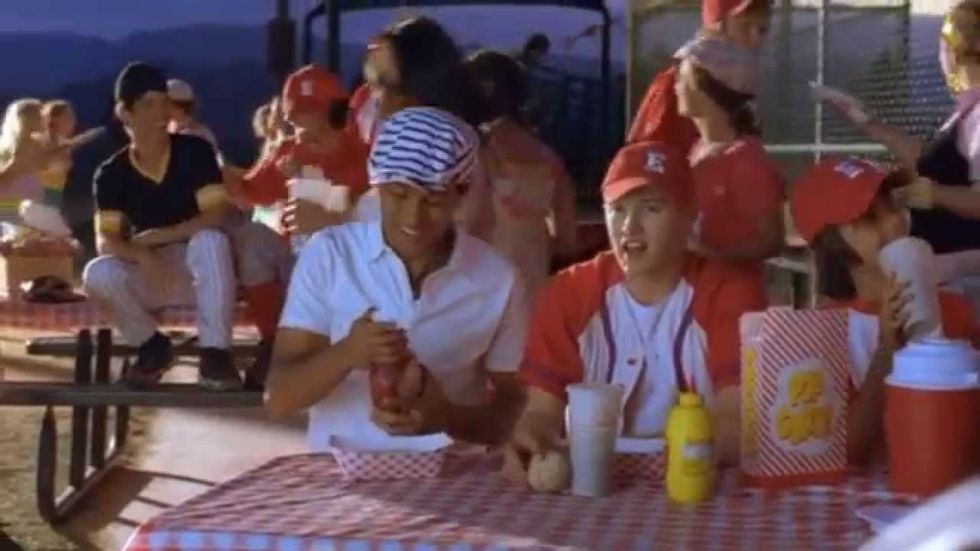Our generation loves nostalgia. Every late 90s - early 00s girl holds High School Musical in a special place in her heart. Even though they're staying up watching Netflix instead of staying up late watching Fresh Prince of Belair re-runs on Nick @ Nite, girls cherish the phase where Sharpay was their ultimate diva inspo and Tiger Beat Zac Efron posters was her monthly mission. It's been eleven years, and college students haven't forgotten a lyric.
Yet, how often do we think about the lyrics that have been become like muscle memory to us? Yes, we love the music, the nostalgia, and the cute guys. However, how often do you think about the struggles each of the characters went through?
Most stories that revolve around high school like to ignore the inevitably that its characters need to go to college. However, in High School Musical, this inevitably looms over the ensemble and is the catalyst for most of the tension between characters and the character's personal anxiety.
When you're around ten years old, these problems seem far off. Failing a class doesn't have many consequences. We think about boys but have never been with one. We're not thinking about our career, school admissions, or a professional resume. We could try, but really we couldn't understand any of the character's struggles.
However, reanalyzing as an adult, High School Musical can be more than a campy teen drama. It contains powerful life lessons we can carry with us into our adult lives.
As the trilogy progresses, Gabriella becomes conflicted between her career ambitions and her romantic relationship with Troy. Many people meet their future spouse in college, but sometimes conflicting life plans can get in the way. You can find yourself changing your plans to keep your romantic relationship feasible. When you're young in love, it can feel like sacrificing those ambitions to be with someone is the ultimate gesture of devotion. As a couple, you feel like you can overcome anything, and it can be easy to forget to look out for yourself. Making pro-active career moves are more concrete than a romantic relationship. This is especially a problem for young women.
Despite Troy's persistence, Gabriella refuses to compromise. She's clear about what she wants and gets into Ivy League schools. Though she appears again, she leaves high school early to attend Stanford.
"Gotta Go My Own Way" is a power anthem who finds her professional resolves wavering because of a relationship.
Finding out who you are is hard. It's even harder when you're living in the shadow of an over-bearing family member, like Sharpay. Ryan is kinda of a goon in the first movie, but later, he steps into its own. When you have strong family ties, it can be hard to become independent, especially in college. Not only because you can't function on your own, but also because your strong sense of family loyalty may make you feel guilty for abandoning them. Often, students who feel their family needs them feels their success means leaving them behind.
Ryan's interests mimic Sharpay's, but in the second movie, he finds new interests and friends apart from her.
He becomes his own person, and in the next movie, wins a scholarship to Julliard, while his sister does not.
Ryan's story is not only about becoming your own person, but also, like the story of the first movie, it's about the subversion of gender roles and enjoying interests outside of the stereotype you have of yourself (The song "Status Quo" is all about this). Ryan is undoubtedly gay-coded, therefore his interests and style are feminine. Yet, he begins to embrace things and clothes that are considered masculine (likewise, hyper-masculine Chad embraces his style and interests). In the struggle to find our identity, it's easy to use labels, and in turn, not do anything that defies those labels and makes us question our self-image. This is even more amplified when you're a part of an oppressed social group (the pressure for gay people to be flamboyant, the pressure for black men to be masculine). However, real people are not characters, and their interests and behavior dynamic and complex than labels and stereotypes. It's important for our growth that we don't box ourselves in.
Sharpay may have been privileged, but nobody can say anything was handed to her. She is nothing if not sheerly tenacious. She's so hard-working the internet has collectively pardoned her for being the antagonist, calling her "The True Victim of High School Musical." Sharpay put everything she and her brother had into theatre, while wishy-washy Troy and Gabriella kinda had their fingers in two cakes. Had Gabriella never transferred to East High, things might have turned out differently for her. It seems like luck got in the way.
The economic outlook for millennials is poor. At times, the odds can seem overwhelming. Even if you do work hard, the odds of getting your dream job are slim. It is easy to think if that's the case, why work hard at all? Why dream if it leads to disappointment?
Yet failing isn't falling down, it's not getting back up. Sharpay doesn't get the lead in the school play in the first movie, she can't be in the talent show in the second, she doesn't into Julliard in the third. In her spin-off movie, she faces far more discouraging setbacks. But it doesn't stop her momentum. We fear having to cope with disappointment, but the way to cope is keeping dreaming.
Sharpay's story is about failure. In your field, you might not always get the job you want, and there will always be more talented than you. But you need to keep working hard regardless. People (and employers) admire you for being so tenacious like we admire Sharpay. Sharpay has to go to a state school, while her brother attends Julliard. She must have felt low at that moment, yet in time, she becomes more successful than him.
And everything Sharpay sings is a power anthem.








 Photo by
Photo by  Photo by
Photo by  Photo by
Photo by 



















